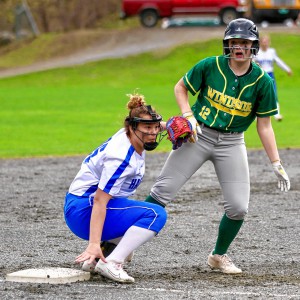
Latest News
 2024 Upper Valley high school softball guide
2024 Upper Valley high school softball guide

Out & About: Vermont Center for Ecostudies continues Backyard Tick Project
WHITE RIVER JUNCTION — The Vermont Center for Ecostudies is looking for people who are willing to allow researchers to study their lawns as part of the Upper Valley Backyard Tick Project.Jason Hill, a quantitative ecologist at the White River...

James Parker granted parole for his role in Dartmouth professors’ stabbing deaths
CONCORD — A man who has served more than half of his life in prison for his role in the 2001 stabbing deaths of two married Dartmouth College professors as part of a plan to rob and kill people before fleeing overseas was granted parole Thursday.James...
Most Read
 Football helmet maker buys Lebanon’s Simbex
Football helmet maker buys Lebanon’s Simbex
 James Parker granted parole for his role in Dartmouth professors’ stabbing deaths
James Parker granted parole for his role in Dartmouth professors’ stabbing deaths
 Zantop daughter: ‘I wish James' family the best and hope that they are able to heal’
Zantop daughter: ‘I wish James' family the best and hope that they are able to heal’
 Kenyon: Dartmouth alumni join union-busting effort
Kenyon: Dartmouth alumni join union-busting effort
 Parker up for parole more than 2 decades after Dartmouth professor stabbing deaths
Parker up for parole more than 2 decades after Dartmouth professor stabbing deaths
 Through new school partnerships, CRREL seeks to educate young scientists
Through new school partnerships, CRREL seeks to educate young scientists
Editors Picks
 Apply to join the Valley News Reader Advisory Board
Apply to join the Valley News Reader Advisory Board
 A Life: Priscilla Sears ‘was bold enough to be very demanding’
A Life: Priscilla Sears ‘was bold enough to be very demanding’
 Kenyon: Dismas House celebrates 10 years of fresh starts in Hartford
Kenyon: Dismas House celebrates 10 years of fresh starts in Hartford
 Editorial: Accounting can now begin in Claremont police case
Editorial: Accounting can now begin in Claremont police case
Sports

Football helmet maker buys Lebanon’s Simbex
LEBANON — Riddell Sports, which makes the helmets worn by more than 75% of players in the National Football League, has purchased Simbex, a Lebanon-based company that revolutionized the monitoring of head impacts in athletics.The purchase price was...
 2024 Upper Valley high school track and field guide
2024 Upper Valley high school track and field guide
 Thetford tops Windsor in 19-18 softball slugfest
Thetford tops Windsor in 19-18 softball slugfest
 2024 HS boys lacrosse guide
2024 HS boys lacrosse guide
 Kenyon: Dartmouth alumni join union-busting effort
Kenyon: Dartmouth alumni join union-busting effort
Opinion

A Yankee Notebook: An inevitable and terminal move
Living three and a half hours apart, as we do, my dear friend Bea and I get to see each other about every two weeks or so, on average. This is almost without doubt an ideal arrangement, as our lifestyles are quite different, and neither of us could...
 Editorial: Gambling tarnishes America’s sporting life
Editorial: Gambling tarnishes America’s sporting life
 By the Way: A white nationalist’s many mistruths
By the Way: A white nationalist’s many mistruths
 Column: The age-old question of what to read
Column: The age-old question of what to read
 Editorial: Transparency wins in NH Supreme Court ruling
Editorial: Transparency wins in NH Supreme Court ruling

Photos

Preserving habitat in Etna
 Pitching in
Pitching in
 Picture day prep
Picture day prep
 Helping a good cause in Etna
Helping a good cause in Etna
 Spring cleaning
Spring cleaning
Arts & Life

Art Notes: After losing primary venues, JAG Productions persists
For much of its history, JAG Productions, the small, White River Junction theater company that specializes in telling stories from deep inside the black, queer, American experience, has had to be nimble. Company founder Jarvis Antonio Green has...
 Over Easy: Marvels in the heavens, and in the yard
Over Easy: Marvels in the heavens, and in the yard
 Art Notes: The Pilgrims to perform ‘last’ show Saturday in Hanover
Art Notes: The Pilgrims to perform ‘last’ show Saturday in Hanover
 Upper Valley residents witness total eclipse
Upper Valley residents witness total eclipse
Obituaries
 Douglas G. Whitcomb
Douglas G. Whitcomb
Hartland, VT - Douglas G. Whitcomb, age 84, passed Wednesday, February 21, 2024. Services will be held in The Vermont Veterans Memorial Cemetery Chapel in Randolph Center, VT, on Friday... remainder of obit for Douglas G. Whitcomb
 Edward Peter Rogenski
Edward Peter Rogenski
Newport, NH - Edward Peter Rogenski 11/10/1938 - 03/28/2024 Edward Peter Rogenski better known as Pete passed away peacefully at his home in Newport New Hampshire. He was 85 years old.... remainder of obit for Edward Peter Rogenski
 Harold Graham
Harold Graham
Woodsville, NH - Harold "Jack" John Graham, 95, passed away at his home on Monday, April 15, 2024, with family at his side. He was born in his family home on Savage Hill in Lisbon, NH on No... remainder of obit for Harold Graham
 Lisa Gurney
Lisa Gurney
Newbury, VT - Lisa Marie Gurney, age 55, passed Thursday, March 7, 2024. There will be a graveside service on Thursday, May 2, 2024, at the New Oxbow Cemetery in Newbury, VT, at 10 AM. ... remainder of obit for Lisa Gurney

 Local Roundup: Rivendell extends baseball win streak
Local Roundup: Rivendell extends baseball win streak
 2024 Upper Valley high school girls lacrosse guide
2024 Upper Valley high school girls lacrosse guide

 Amid financial difficulties, Lebanon-based Revels North cancels midwinter show
Amid financial difficulties, Lebanon-based Revels North cancels midwinter show 
